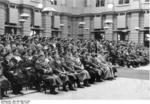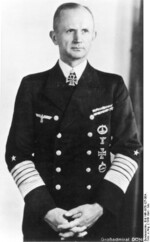Karl Dönitz
| Surname | Dönitz |
| Given Name | Karl |
| Born | 16 Sep 1891 |
| Died | 24 Dec 1980 |
| Country | Germany |
| Category | Military-Sea |
| Gender | Male |
Contributor: C. Peter Chen
ww2dbaseKarl Dönitz (sometimes Doenitz) was born in Grünau near Berlin to engineer Emil Dönitz and Anna Beyer. He started his career in the Kaiserliche Marine, or the German imperial navy, in 1910 as a cadet. During WW1, he served first aboard a light cruiser then aboard the U-boat UC-68. On 4 Oct 1918 he was captured by the British and was a POW until Jul 1919. Returned to Germany in 1920, he remained in the navy and steadily climbed the ranks. His first commission was the cruiser Emden, in which he commanded for a year-long world cruise. On 1 Sep 1935 he became the commander of the three-boat 1st U-boat Flotilla, then in 1939, he became the commander of the German submarine fleet.
ww2dbaseBy now among the world's forefront submarine expert, Dönitz pushed for a German fleet consisted almost entirely of U-boats, claiming that the ability to deprive Germany's enemies of vital supplies such as food and oil was more effective than sinking enemy ships with the risk of combat. He claimed that given 300 of the newer Type VII U-boats, he could defeat the entire British navy utilizing tactics that would later be named "wolfpacks". Much of his lobbying went unheard as his superior, Grand Admiral Erich Raeder was a traditionalist who believed in surface ships, and further Raeder did not believe Germany had a chance to contest the control of the sea from the British. In addition, Raeder thought submarine warfare was cowardly.
ww2dbaseWhen war with Poland broke out in 1939, Dönitz's fleet consisted of 50 U-boats, many of them of the short-range type. The submarines were sent on missions that targeted both warships and transports, with the latter achieving a much greater rate of success. For the various degrees of success, he was promoted to vice admiral on 1 Sep 1939. By 1941, Dönitz was wielding a significant number of Type VII U-boats and threatened Allied shipping as far as the east coast of the United States. He believed that if he had a fleet of one hundred U-boats, he could paralyze Britain; with three hundred, he said he could sink 700,000 tons of shipping a month. Events later in the war proved he could have defeated Britain with the German Navy alone. By end of 1942, despite the Enigma codes being broken twice in the previous months, the number of Type VII U-boats reached its height and wolfpacks were scoring record kills in the Atlantic. Finally Dönitz was able to convince Adolf Hitler of the effectiveness of submarine warfare, and for which he replaced Raeder as the commander-in-chief of the German navy, given full authority to command the German naval forces. To Dönitz's dismay, however, this appointment as the commander of the German came too late, as the opportunity to completely blockade Britain had largely gone by. Even though the German Navy had begun to launch the deadlier Type XXI U-boats, submarine production had already been sabotaged by Hitler's personal orders to relocate naval resources to the building of surface warships instead of submarines. Four months after this appointment, Dönitz officially gave up the initiative of blockade in May 1943. He could have defeated Britain by the use of the Kriegsmarine alone had he been given the go-ahead in 1939; once again, Hitler's meddling in the military saved Britain from a worse fate.
ww2dbaseOn the personal side, both of Dönitz's sons served in German military, and both died for their country. His older son, Klaus, died aboard a torpedo boat off Selsey, England on 13 May 1944. The younger son, Peter, died aboard U-954 in the North Atlantic on 19 May 1943. The death of Peter in May 1943 might have had influence upon his decision to give up the efforts to starve the British isles the same month, though he continue to serve as a dutiful and loyal officer to Germany.
ww2dbaseIn Apr 1945, Grand Admiral Dönitz was chosen by Hitler as the next leader of Nazi Germany before Hitler committed suicide. He was given the order by Hitler to take on the title of President, not Führer. Tired of war, he ordered that "[a]ll forces under German control to cease active operations at 2301 hours Central European Time on 8 May 1945." This ended WW2 for Germany. He was arrested on 23 May 1945 in Flensburg near Denmark and was convicted for war crimes at the Nuremberg Trials. Dönitz was not a member of the Nazi party, therefore despite his support of Hitler's anti-Semitic campaigns he was not charged for genocide; instead, his charges all centered around the fighting of an unrestricted war in the Atlantic, endangering the lives of civilians on the open sea. The lack of charges for anti-Semitism was most controversial especially after his statement during the trials saying "I was of the opinion that the endurance, the power to endure of the people, could be better preserved if there were no Jewish elements in the nation." He served 10 out of his 11.5-year sentence in prison. Upon release in 1956, he retired to Aumühle near Hamburg where he published his memoirs Ten Years and Twenty Days in 1958, wrote My Ever-Changing Life in 1968, and passed away in 1980.
ww2dbaseSources: Juno Beach Centre, the Last Lion, Second World War, Wikipedia.
Last Major Revision: Jul 2006
Karl Dönitz Interactive Map
Photographs
 |  |  |  |
Karl Dönitz Timeline
| 16 Sep 1891 | Karl Dönitz was born. |
| 30 Sep 1940 | Karl Dönitz inspected the Italian submarine Alessandro Malaspina at Bordeaux, France. |
| 25 Apr 1941 | Konteradmiral Karl Dönitz, the head of the German submarine branch, reiterated Adolf Hitler's orders that incidents with United States vessels must be avoided at all cost. |
| 17 Sep 1942 | German Navy Admiral Karl Dönitz, who had previously supported rescuing survivors of submarine targets, ordered his submarine commanders to cease such actions in light of the Laconia incident on the previous day where an American bomber attacked a German submarine, full of survivors, flying a large red cross flag. |
| 26 May 1943 | At Peenemünde, Germany, before Hermann Göring, Erhard Milch, and other top German leaders, an A-4 rocket and a flying bomb were tested. The A-4 rocket flew perfectly, while the flying bomb crashed only after a mile or two of flight. |
| 12 Nov 1943 | Karl Dönitz complained in his diary that Allied air superiority and radar was severely restricting his ability to conduct campaigns. |
| 18 Jan 1944 | Karl Dönitz secured Adolf Hitler's approval for building Type XXVIIA midget submarines. |
| 1 May 1945 | Near Plön, Germany, Karl Dönitz took his new post in accordance with Adolf Hitler's will and immediately ordered the strongest resistance in the east, as tens of thousands of civilians struggled to stay ahead of oncoming Soviet forces. |
| 3 May 1945 | Admiral Dönitz established the seat of his government in Denmark. |
| 7 May 1945 | German President Karl Dönitz decreed that "[a]ll nominations for the bestowal of the Knight's Cross of the Iron Cross and their higher grades which have been received by the Oberkommando der Wehrmacht - staff of the Wehrmacht high command - until the capitulation becomes effective are approved, under the premise that all nominations are formally and correctly approved by the nominating authorities of the Wehrmacht, Heer including the Waffen-SS, Kriegsmarine and Luftwaffe all the way to the level of the army and Heeres group leadership." |
| 11 May 1945 | German President Karl Dönitz ordered all promotions and awards to cease. |
| 24 Dec 1980 | Karl Dönitz passed away in Aumühle, West Germany. |
Please consider supporting us on Patreon. Even $1 per month will go a long way! Thank you. Please help us spread the word: Stay updated with WW2DB: |
Visitor Submitted Comments
26 May 2011 01:31:57 AM
there was not mentioned that allies after capturing Dönitz tested his IQ and it was 130 something.
There are also rumers that Hitler escaped to south pole with submarine, so it may be related to Dönitz takening over power from Hitler organised him submarine for escape. Something made Dönitz to belive after 9 may that Germany lives on - untill 23 may when he was captured - maybe he knew something. By that time there was already political frontation between Soviets and west allies(and secret contracts/contacts with german sientists and so on).example space or nuclear project in USA.
8 Dec 2012 02:00:09 PM
Yes, Hitler did escape to the South Pole where he lived out the rest of his life with penguins and living in an iglo.
3 May 2014 03:41:20 PM
I was in the American Navy in the early 1990's and I can't even imagine how cramped and small these uboats plus the American Navy boats and the Royal Navy boats must have been.I find this WW 2 history,especially the European theater fascinating.Admiral Doenitz was a genius.
3 Nov 2015 12:01:04 PM
I would respectfully point out that their is evidence that Grand Admiral Doenitz was a party member, his number is given as 9,664,999 and is on microfilm recrods for the NSDAP. Interesting, although the source as always must be considered, is Speer's claim in "Spandau" page 369 that, "Donitz is National Socialist through and through, and he keeps the Navy free of all bad influences. The Navy will never surrender." They did of course surrender, and it was Doenitz who did it.
3 Nov 2015 10:01:03 PM
I am an retired South African submariner, very curious aboat the truths surrounding German u-boat history. Those are often hard to establisch. Kindly advise.
All visitor submitted comments are opinions of those making the submissions and do not reflect views of WW2DB.

» Start of the Battle of the Atlantic
» First Happy Time
» Second Happy Time
» Laconia Incident
» Black May
» Germany's Surrender
» Nuremberg Trials and Other Trials Against Germany
Ship(s) Served:
» Albatros
» Emden
- » 1,179 biographies
- » 337 events
- » 45,089 timeline entries
- » 1,245 ships
- » 350 aircraft models
- » 207 vehicle models
- » 376 weapon models
- » 123 historical documents
- » 261 facilities
- » 470 book reviews
- » 28,488 photos
- » 365 maps
Chiang Kaishek, 31 Jul 1937
Please consider supporting us on Patreon. Even $1 a month will go a long way. Thank you!
Or, please support us by purchasing some WW2DB merchandise at TeeSpring, Thank you!
1 Dec 2008 06:13:26 PM
As usual, the victor will find all means to punish the vanquished.
It was a war and Doenitz was just doing whatever he could to disrupt the shipping lanes.
Echoing famous lines from Fallout:"War, war never changes."